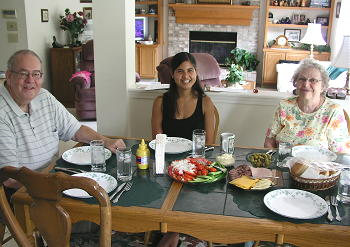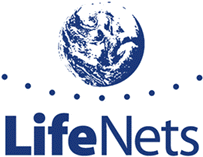Jennifer Myers Teaches "Business 101" Seminar in Malawi and Zambia
June 2008
In the summer of 2007 Jennifer Myers along with Phil Myers and Aaron Blue volunteered to help out Dr. Sam Chilopora with the work of Chizeni Clinic in Balaka, Malawi. We asked the team for an assessment about what they saw, what we could do better and possible ways to do it.
| More Photos |
 Tom Peine, LifeNets chairman, Jennifer Myers and Sue Peine when Jennifer came to Indianapolis on August 28 to tell us about her journey. |
Jennifer told us that most projects were going well and that the people produced good products. But she noted that there was a gap in understanding of how to market products, how to make a profit and how to sustain a business.
Jennifer Myers has been Program Officer, Noble County Community Foundation in northern Indiana.
So we asked Jennifer to go on a mission to Malawi and Zambia to teach simple business concepts to those who received Livelihood Development grants. This took place the last two weeks of June 2008. What she taught included: What is needed to start a business; understanding and marketing what makes a business different from its many competitors; planning and anticipating; money management and bookkeeping; and the importance of mentoring and working together. Jennifer did an outstanding job going alone and teaching the seminar in five location in Malawi and Zambia.
Jennifer writes this report and provides us the beautiful photos in three sections of this report:
"Business 101: The purpose of this trip was to teach simple business concepts to those who have received LifeNets Livelihood Development grants. A summary of the topics include: what is needed to start a business, understanding and marketing what makes the business different than its many competitors, planning and anticipating, money management and book keeping, and even the importance of mentoring and working together. Though the same topics were taught, the presentation was different in each area due to the different group of attendees.
See Also:
|
“First, I must thank God for the opportunity and for keeping me safe as I traveled. I thank LifeNets for all the wonderful work the organization does to better communities here in the United States as well as around the world. This, of course, wasn’t my first trip to visit the projects in Malawi, but my eyes were still opened in awe to the living conditions that continue to be improved, the skills learned, and the overwhelming gratefulness from people who feel loved and cared for not only by those in their own communities but by all of us in the States who support them through LifeNets. They are just so grateful for the chance to succeed. sI thank the host families who took their time to schedule the presentations, set up the project visits and to care for me as though I were a part of their families. It isn’t always easy traveling to another country, but the families welcomed me with open arms, and I truly felt at home. The generosity and love by these families really captured the essence of LifeNets and the outstanding people that are a part of the organization.
.jpg) |
“The main reason for my travels was to present an educational session on simple business concepts and practices. While I presented the information, the attendees shared their own experiences and stories, they asked questions and were just eager to learn from me and from each other. This discussion not only increased the amount of information they learned, but allowed them to see how they could help each other and how they could learn from each other. They left with tools to help them continue learning how to better their projects/businesses, through marketing, planning and money management. And they were reminded of the importance of working together and possibly mentoring those who too are eager to learn.
“The projects I visited continue to survive and benefit the families and communities. Though the growth is not extreme, it is still a start, and the families are taking the necessary steps to help them succeed.
“My visit to Zambia was a learning opportunity for me as well. There I learned of LifeNet’s cattle program. It is through this program that families learn responsibility and ownership. They realize the importance of working as a community. And the program maintains itself, which is incredible to see.
“It is amazing how one can go to teach, but learn so much more in the process. A part of my heart remains with those in Malawi and Zambia as I learned more about myself, about service and how quickly friendships can develop as we work together.”
Elifazi Salawila, who coordinated Jennifer’s visit in Malawi, wrote us:
“Thank you for sending Jennifer to us. Her visit to Malawi has been of great benefit to us all. She came to give us a business key, which was not known to some of us. And we hope that with this business key our businesses will improve and grow. We are glad that she has been able to visit all the projects which were on our programme, both Blantyre and Lilongwe. Jennifer is a cheerful and flexible lady who strived to learn our culture. This kind of heart helped her to associate with any class of people without problems.”
Here is a summary of the five presentations that Jennifer made on this mission:
.jpg) In Blantyre the presentation went well as there was good discussion.
Attendees asked wonderful questions and took a real interest in
understanding the skills needed to help their businesses grow. It
was interesting to see the interaction between the attendees as well.
This group really helped each other and I think they began to understand
their own knowledge that they have and how they can network and work
together.
In Blantyre the presentation went well as there was good discussion.
Attendees asked wonderful questions and took a real interest in
understanding the skills needed to help their businesses grow. It
was interesting to see the interaction between the attendees as well.
This group really helped each other and I think they began to understand
their own knowledge that they have and how they can network and work
together.
In Lilongwe it was interesting, that as I visited the projects in this area, several of the grantees/attendees took many of the ideas that they learned in the presentation and were able to share with me how they can implement them. It showed that they really took in the information.
In Lusaka, Zambia the presentation here was different as several in this area really do have a grasp on business. They didn’t seem to really need the basics, but of course were grateful for the information and expressed that they too can implement some of the ideas. They too were really able to teach each other, and that was important for them to see.
In Nalubanda the presentation here was very interesting since it basically dealt with maize farming/selling and cattle raising. Though the attendees took in the information and were very grateful for what they had learned, they actually had a lot of questions for Mr. Banda. But it was through their questions and his response that I got a very good glimpse of how the program works. Mr. Banda works very well with this group and the program provided here is so beneficial to the families and the communities. There is a real sense of ownership, responsibility, for those who participate in the program.
Finally in Mapoko, there was a different aspect to the presentation. This group was just starting its work with the cattle/maize program available through LifeNets. They really were in need of the business information, once they figured out I wasn’t there to teach them how to farm or raise cattle. They asked good questions and just really soaked in all the information that they could. Mr. Banda was there and answered all their questions that dealt specifically with the programs LifeNets offered, and again I learned.
In addition, Jennifer visited many of our Livelihood Development projects.
Project Visits: Throughout the trip, I was able to visit various projects to see their progress and to hear their concerns.The projects are surviving and benefiting many. It takes the simple steps of funding and education to better a community, and it can definitely be seen in Malawi and Zambia thanks to LifeNets.
| Blantyre Projects: 1.
Music Studio/School Lilongwe Projects: 1. Clinic Zambia Projects: 1. Cattle and Revolving Farm Credit Program
|
One of our livelihood development projects: a shop in a busy Blantyre shopping district
Livelihood development project: neighborhood store. Jennifer holding a live chicken.
Jennifer with Bilton, Miriam and family |
.jpg) With Lester Njewa (left) and husband Chiphale (right) who recently suffered stroke.
Jesse who does well sewing and selling her wares
Miriam with sewing machine
Ritual of washing before a meal
The Seminar
Hardware store: LifeNets project
LifeNets gasoline pump
Sam Chilopora, Jennifer, Esther Chilopora, Lester Njewa
Emily -- skilled seamstress
Lilongwe host Wordsworth Rashid
Under construction: plumbing shop and beauty salon
In Mapoko, Zambia
Seminar in Zambia
|
.jpg) Closer look at the live chicken
Bilton's studio (see YOUTUBE interview)
Studio recording equipment
LifeNets Maize Mill
Activity at the Maize Mill
Knitting machine
Loveness with son Harrison
Latest LifeNets well in Lilongwe.
Jennifer at the Well. Is the pail full?
Grocery store
Kambani Banda speaks |

.jpg)
.jpg)
.jpg)